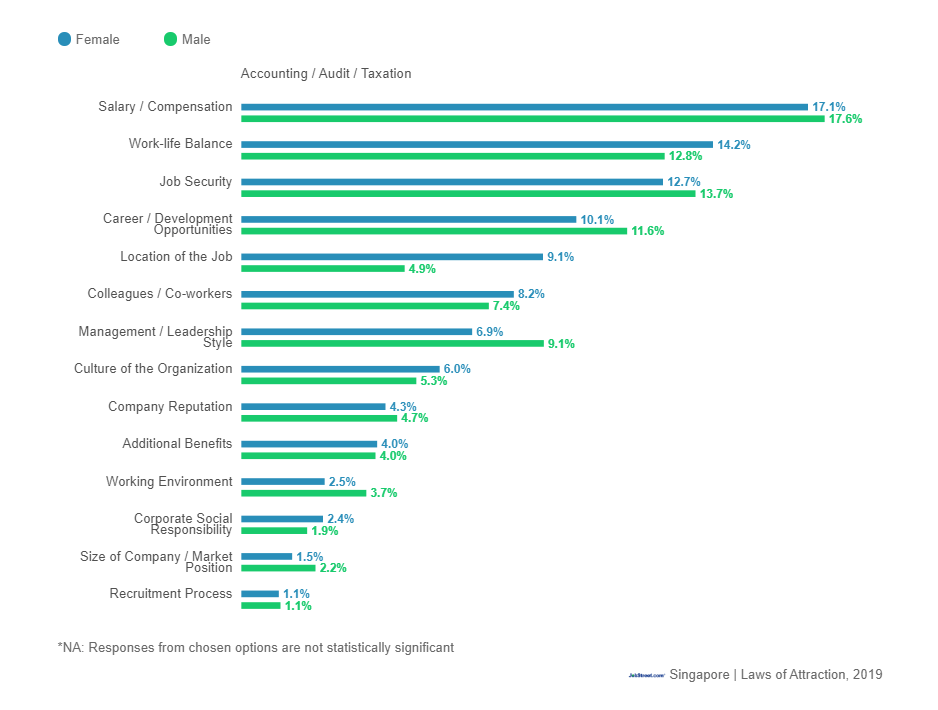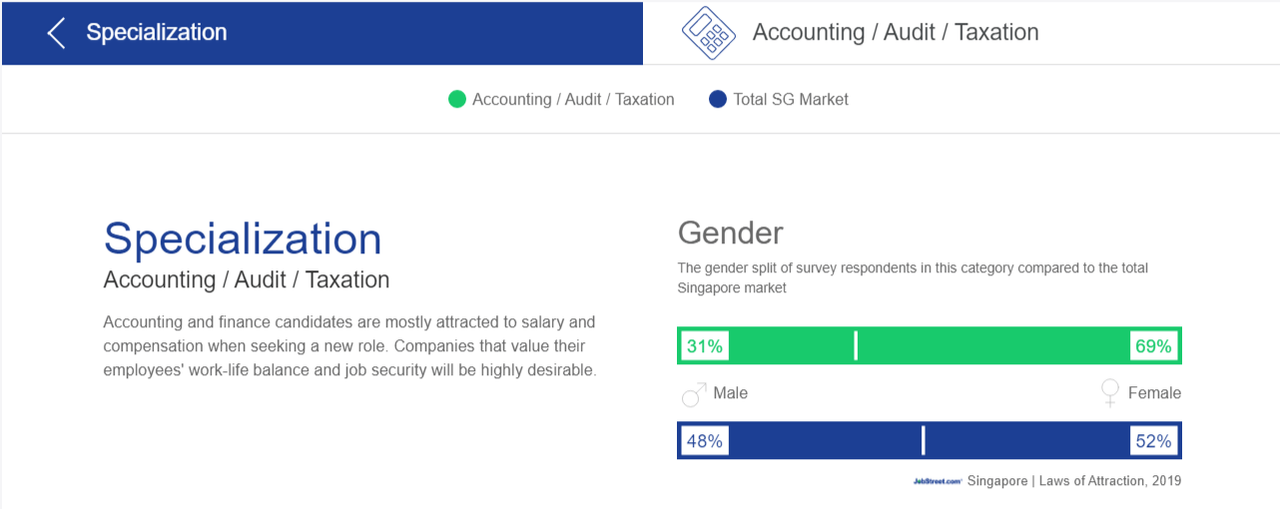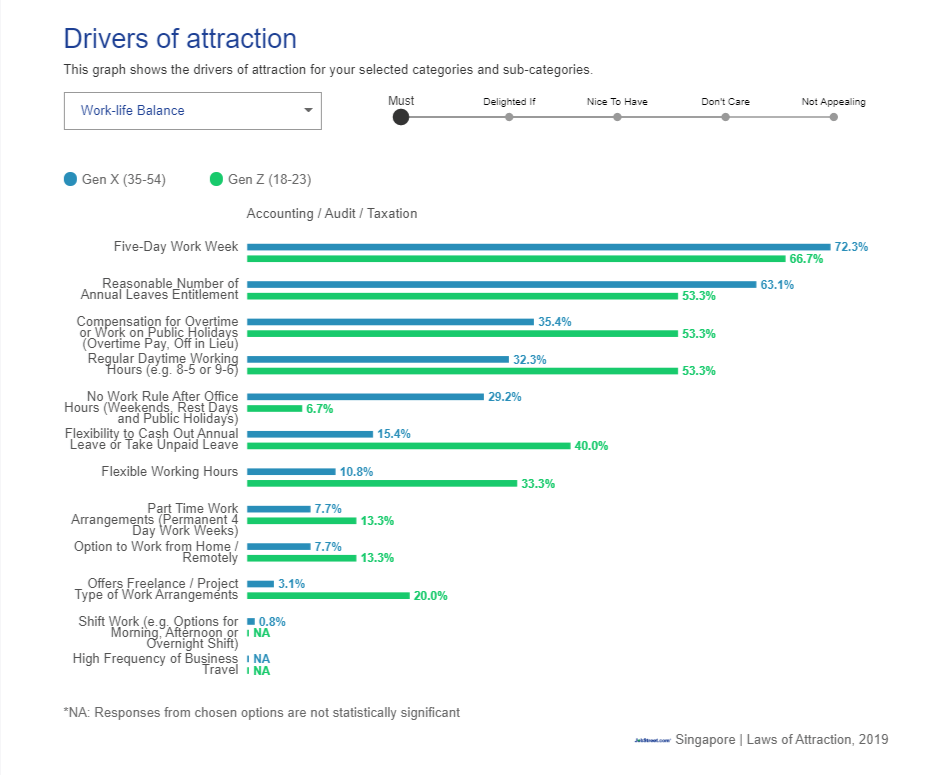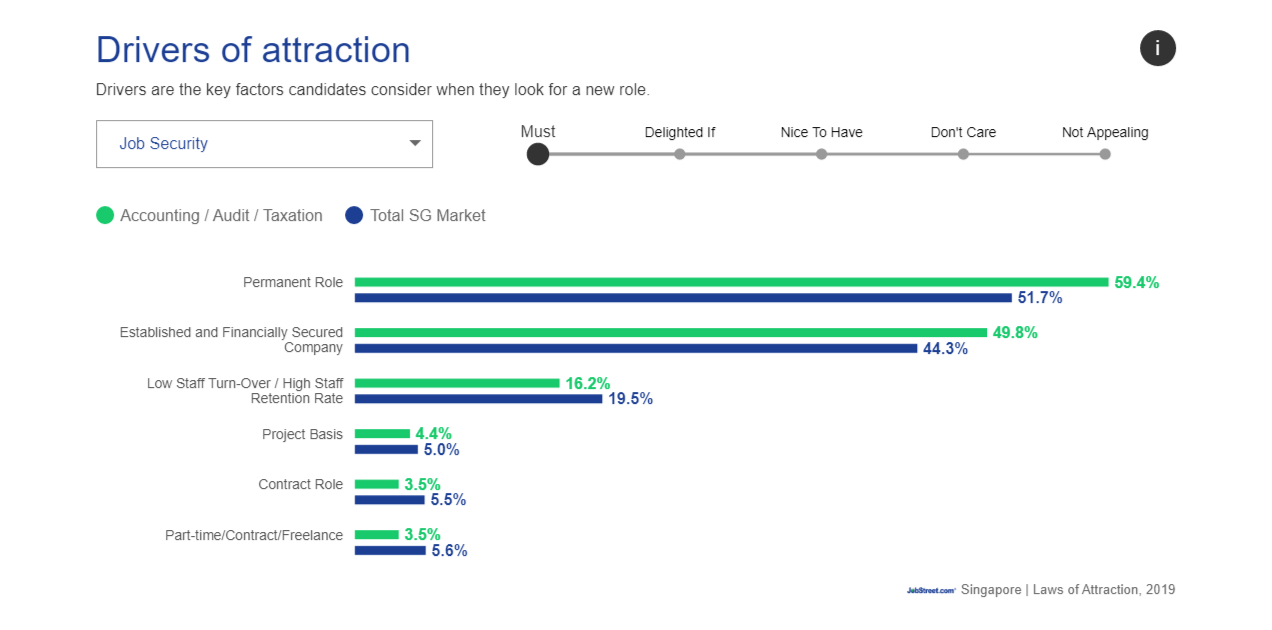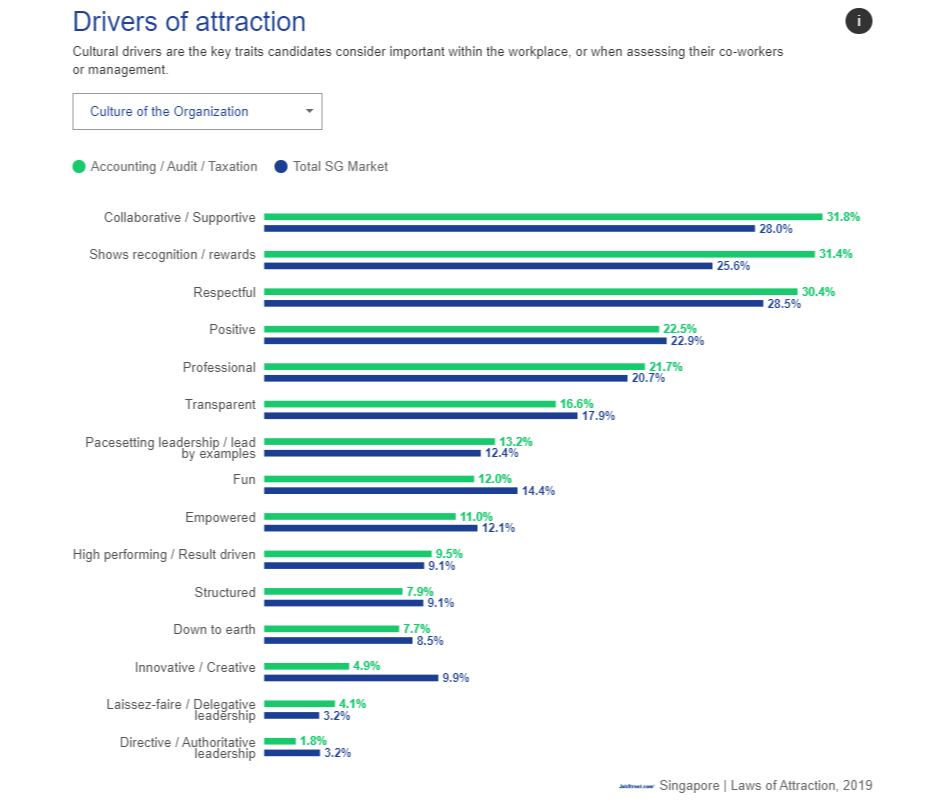
How To Attract and Retain Great Accounting Professionals
The demand for Accounting professionals has been on a steady rise in Singapore, driven by the growth of economic activities and the proliferation of technology startups both locally and regionally.
With the increasing demand, companies and recruiters are gearing up to attract (and retain) great accounting professionals amid a highly competitive talent pool. In order to compete successfully, employers first need to focus their sights and pinpoint the exact information needed that will help attract the best accounting candidates.
The real-world insights and drivers of attraction presented below - drawn from the wealth of data contained in the Laws of Attraction (LOA) portal at JobStreet.com - serve as a valuable guide for employers looking to hire great accounting professionals in Singapore today.
Top drivers of attraction
The top 3 factors that is important to candidates in Accounting/ Audit/ Taxation specialisations are Salary/ Compensation, Work-life Balance and Job Security when considering a job position. It can be further observed that while both genders in accounting fields rank remuneration as their foremost factor, the females however rank work-life balance above job security while the reverse is observed for males.
Interact with this dataset here
As observed earlier, women in accounting specialisations are more conscious about the aspect of work-life balance as compared to men who tend to concentrate more on job security and development opportunities. Given that women in accounting make up a markedly higher percentage at 69% as compared to the average composition of 52% females in the overall Singapore market, employers might find it worth placing more attention on work-life matters especially when planning recruiting and/or staff retention strategies and policies for their accounting staff.
Salary compensation
Most seek a strong base pay with guaranteed annual bonuses and other benefits such as insurance cover. Recruiters and HR leaders keen on recruiting accounting talent should consider implementing strategies such as offering bonuses on contract signing and at completion.
Work-life balance
As seen earlier, women in accounting roles consider the factor of work-life balance as a close 2nd to remuneration. Given the sizable amount of women workers in accounting, employers and recruiters should implement strategies that would favour a conducive work-life balance in order to attract talented women into their organisations. That said, the definition of work-life balance varies due to the fact that the workplace environment is made up of employees in different life-stages, each with very different needs.
Interact with this dataset here
As can be seen above, older Gen X workers view a regular five-day week as a key factor of work-life balance while a much smaller percentage of the young Gen Z holds the same view. While both generations value annual leave entitlements as top factors for work-life balance, it is worth noting that the younger workers are extremely willing to work over-time and during public holidays for extra compensation, perhaps unsurprisingly, as their family commitments are usually lower than their older colleagues.
Job security
A huge number of both potential and existing employees look at job security as a key consideration and make it a priority when looking for their next engagement. The 2 overwhelming aspects of job security employees are attracted to are namely, 1) Permanent Role, and 2) Established and Financially Secured Company. As can be seen in the chart below, this preference is particularly more obvious in the Accounting and related job specialisations.
As candidates sometimes may shun away from applying to small companies with the notion that they do not have the job security to offer, more so the case with Accounting people as seen earlier, newer companies may consider creating more fixed and permanent roles as opposed to contractual or project based positions.
Interact with this dataset here
As companies battle out to recruit and retain the best accounting talents, they should also realise that some certain factors do not resonate well with potential candidates and existing employees. Without good retention strategies and policies, great employees tend to leave the organisation to fulfill their career and personal needs elsewhere.
From LOA data, it can be seen that Accounting professionals highly value a working environment that is respectful, collaborative and supportive, where their efforts are properly recognised and rewarded. Cultural traits that are viewed least positively / importantly by Accounting professionals include authoritative and delegative styles of leadership, and creative work environments.
Interact with this dataset here
Finally, let's conclude by looking at some common challenges companies face in retaining good accounting professionals, or other employees in general.
Lack of training and development programs
Accountants and accounting professionals, more so than many other employees in the organisation, require regular and timely training to keep abreast with changes in the accounting field, which is somewhat more frequent than other fields, to ensure relevancy and legal compliance. A lack in such provisions renders the employee redundant, feels unappreciated and hence leads them to work on their exit strategy.
The good news is, implementing regular training programs for your accounting employees can be neither time-consuming nor costly. Unlike in hands-on roles such as those in engineering or manufacturing fields, accounting people makes one of the best candidates for e-learning training programs. By making training programs and material easily accessible online, desk-bound accounting employees will be able to embark on their designated courses at their own pace and when time permits.
Boredom
A trending notion in the modern workplace is that accounts, tax and finance departments are known to be the most boring departments due to constant repetition of jobs and functions. This leads to work boredom brought about by the lack of challenges which often translates into a demotivated employee with a desire to leave.
One way employers can add some fun and challenges to the mundane work-lives of their accounting staff is to routinely assign them to special projects outside of their daily responsibilities. The occasional breaks from the piles of reports and spreadsheets and the personal interaction with other project members will go a long way in helping your accounting staff feel more fulfilled working with the company.
Micromanagement
Employees should be given the space to manage their affairs without managers constantly breathing down their necks. Micro-management arises as a result of a lack of faith in one’s employees and the ability to perform.
By keeping communications open and clearly establishing boundaries and expectations, managers can effectively reduce misinterpretations and the need to constantly check in on subordinates.
Office politics
The sad reality is that office politics is present in most, if not every organization. Such negative occurrences tend to demotivate workers thus affecting their productivity. Many victims of office politics do not know how to handle the situation effectively and often result in them leaving the company as an easy way out. Due to the nature of their jobs, accounting professionals are characteristically a less vocal lot and thus oftentimes find themselves in that predicament.
As a leader, you can effectively manage office politics by facilitating and encouraging effective communications between staff members so as to minimise misunderstandings. And by remaining fair and impartial at all times, managers can help cultivate a positive work environment that's based on trust and meritocracy.
Data used in article are drawn from Data Lab - the interactive exploration tool at JobStreet.com's Laws of Attraction portal - based on a comprehensive study of more than 7,000 candidates across 20 industries in Singapore.
